My conflicted, confused thoughts on "Two-Face: Crime and Punishment" by DeMatteis and McDaniel
I wonder... when people think of the best Two-Face stories, how many think of Batman/Two-Face: Crime and Punishment? It seems to have fallen into obscurity, and then, being out-of-print for over a decade certainly doesn't help matters,* but it’s one of the few to directly tackle the war inside Harvey’s head, and the years of child abuse which caused that division in the first place.
Why have no other stories looked at the abuse angle with Two-Face? I’d imagine it’s because “angsty, abused childhood” is the #1 cliched origin for villains. Now, I love how Eye of the Beholder made that cliche work perfectly for Harvey in a way that was fitting and deeply emphasized the tragic aspect of the character, but it’s such a complex, nuanced backstory that I fear for how other writers would screw it up. Thus, it’s probably best that it’s avoided by most writers... but then, J.M. DeMatteis is not like most writers. The world of comics is poorer for that.
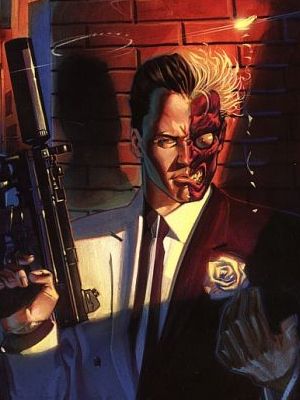
That said, my personal opinion of this story has fluctuated over the years, all the more so recently after reading DeMatteis' Spectacular Spider-Man story, "The Child Within. So I will especially welcome your comments for this review, especially from those who've read the story in full. Is this a powerful take on Two-Face, or yet another half-baked child abuse origin?
First: an introduction.
You guys know that I normally like to cut in with commentary every few pages or so, but I'm gonna hold off for these first seven pages. DeMatteis had written an opening with such a great flow that I'd be loathe to break it up. So let me get one big observation out of the way first, something for you folks to bear in mind as you read on.
Here's the thing: I think that this story is the first time we've ever seen the two sides of Harvey's mind interacting with one another so explicitly. There was a touch of that in Eye of the Beholder (written by Andrew Helfer, who was DeMatteis' editor on Justice League International), followed by a weeny bit of both sides in Doug Moench's Knightfall-era story with Klaus Janson, but not to this extent. Before these stories, Two-Face shifted between his good and evil sides, but neither had a distinct personality, nor did they ever interact with one another for any real lengthy period of time.
As I read this, the question I'm wondering is whether or not it's always been like this inside Harvey's head, and we've just never seen it. If it wasn't, then maybe this story presents the progression of Harvey's mental illness. The sad, scary possibility here is that perhaps he's only been getting worse.
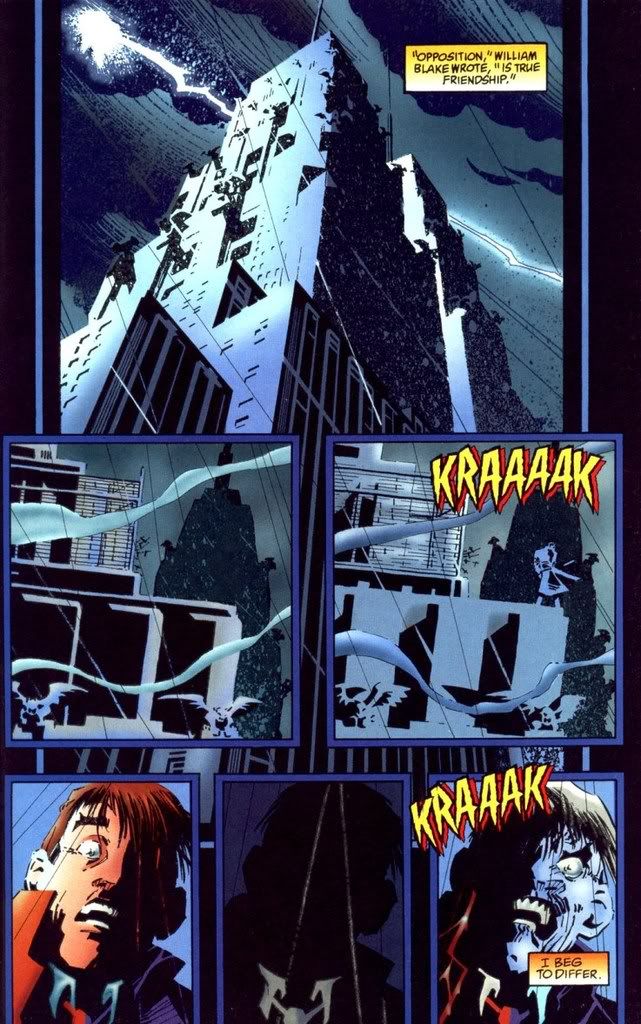
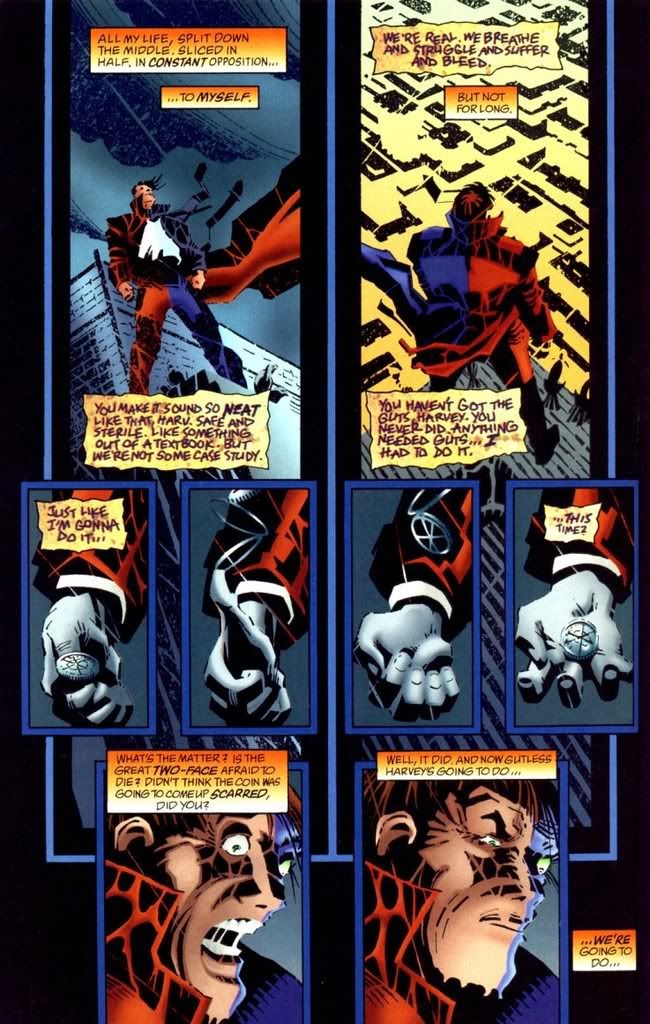

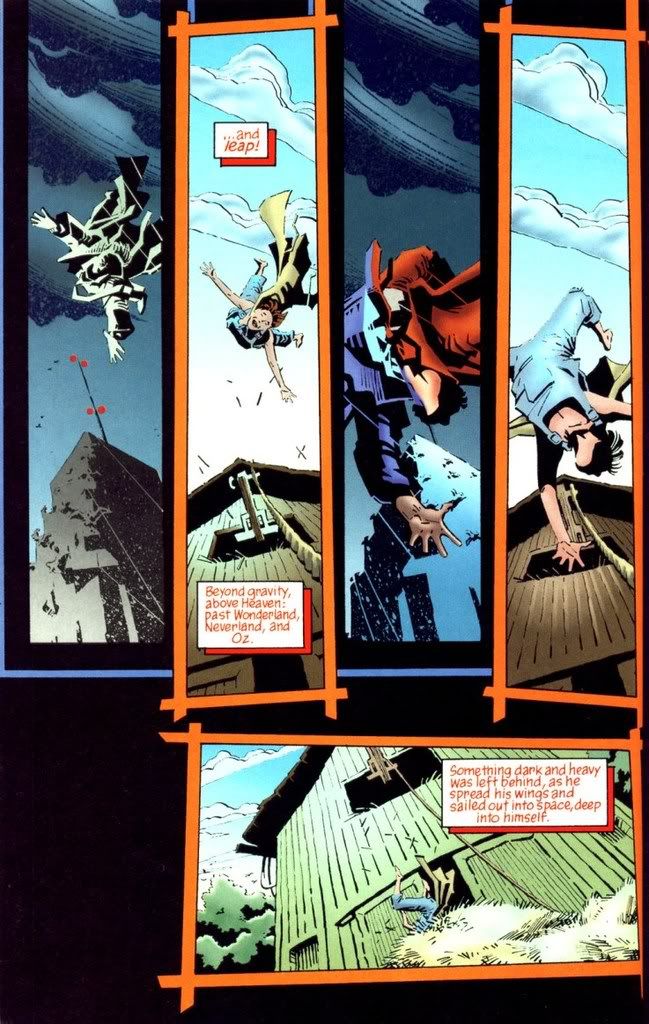
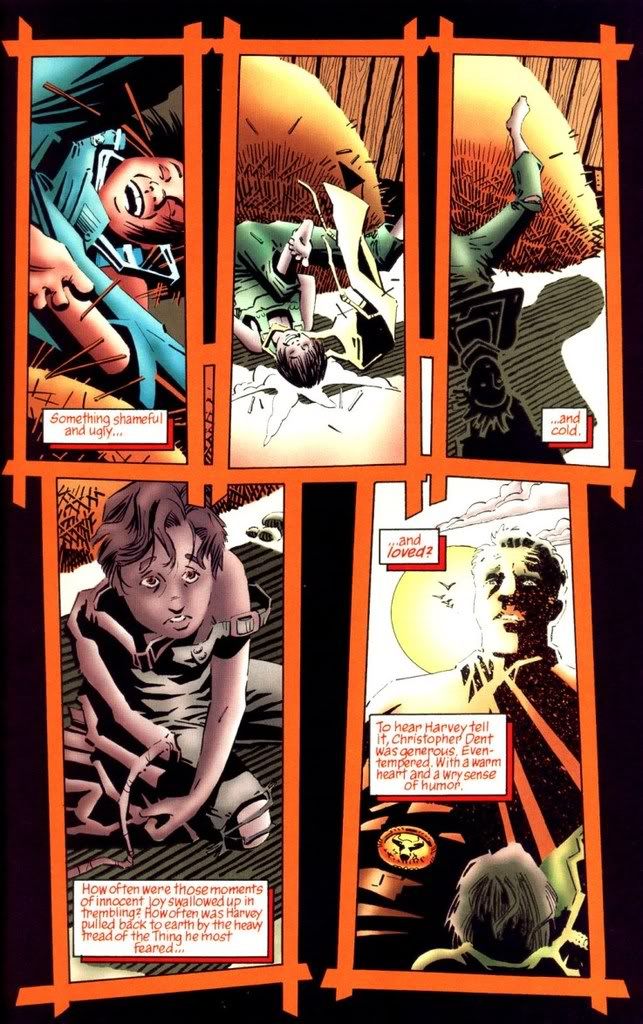
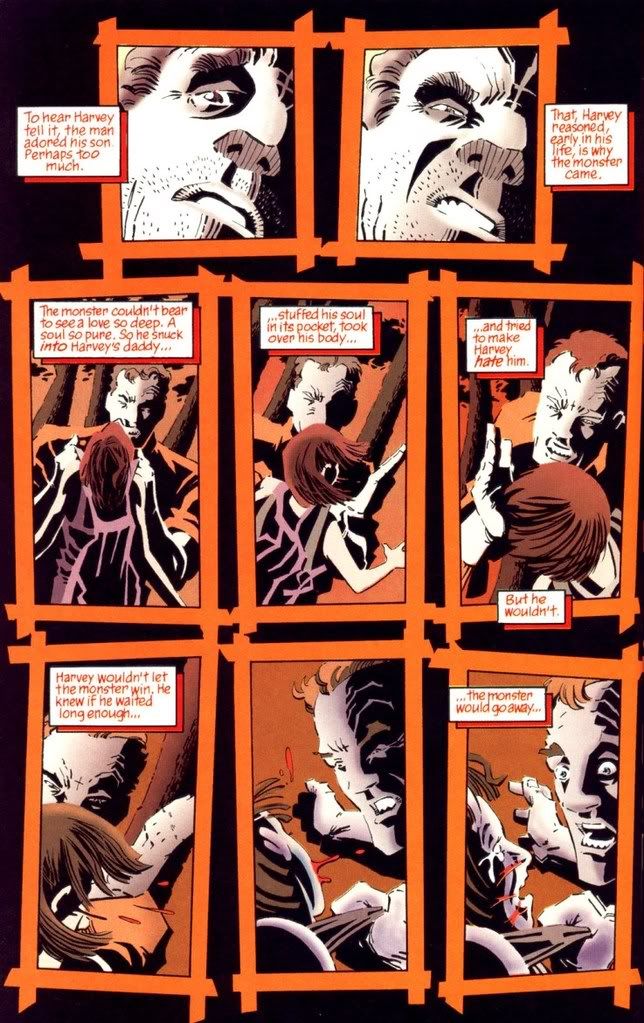
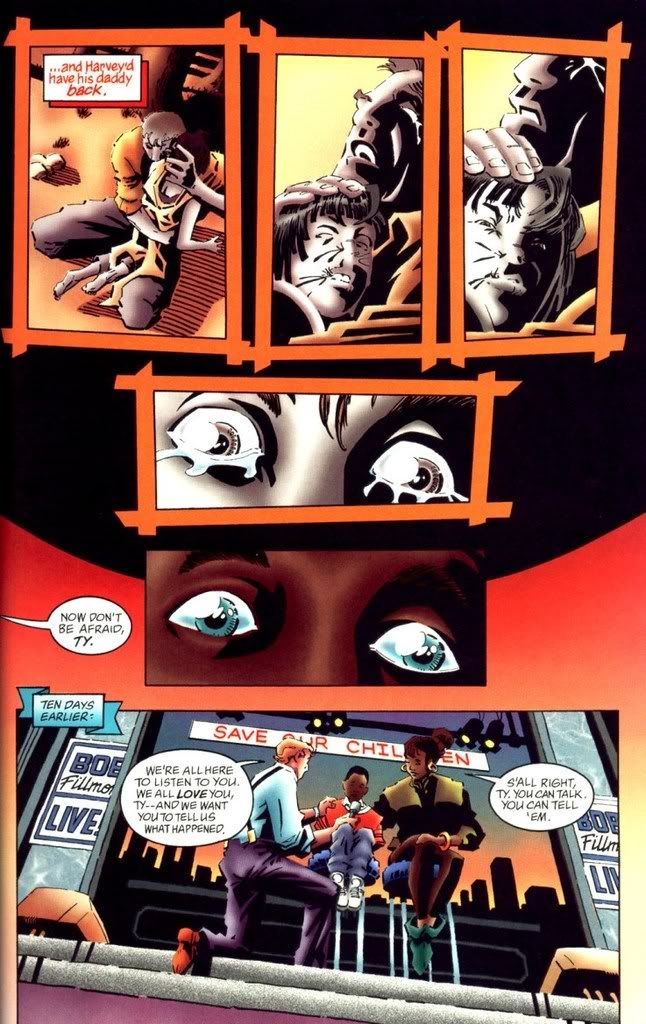
Whew.
Okay, first off, does anyone else find it jarring to imagine little Harvey Dent on a farm, even if he was only visiting? He's a dyed-in-the-wool city boy, far as I'm concerned. The only reason for that setting is, I'd imagine, to give Harvey a safe place to fall from a decent height while still not hurting himself. You can't really do that, say, off of fire escapes and into piles of garbage sacks, can you?
At the very least, it gives us the only sketchiest details about Christopher Dent's own past. In Eye of the Beholder, all we knew was that he was a drunken man who probably liked to play con games. Here, I think it's safe to say that the elder Dent was a displaced farm boy, right down to his steer-headed belt buckle. If his father, Harvey's grandfather, was still alive at the time, I would have been interested to know what he might have made of Harvey's injuries. There's always the possibility--briefly raised later on--that Grandpa had given Christopher the same treatment. Just like with Norman and Harry Osborn, the horrible cycle continues.
But now let's talk about what's actually IN this story.
We flash back to the modern-day events which led to the opening scene on the tower. Two-Face crashes a live TV broadcast of a Maury Povich style talk show, focusing on interviews with abused children. Harvey kills the host (with a pair of giant snakes, because why not?), and proceeds to condemn the viewing audiences who tune in to support this kind of "entertainment." What's Harvey's motivation? It's certainly not monetary. Kind of makes me wonder how he can amass and keep an army of henchmen at his disposal.
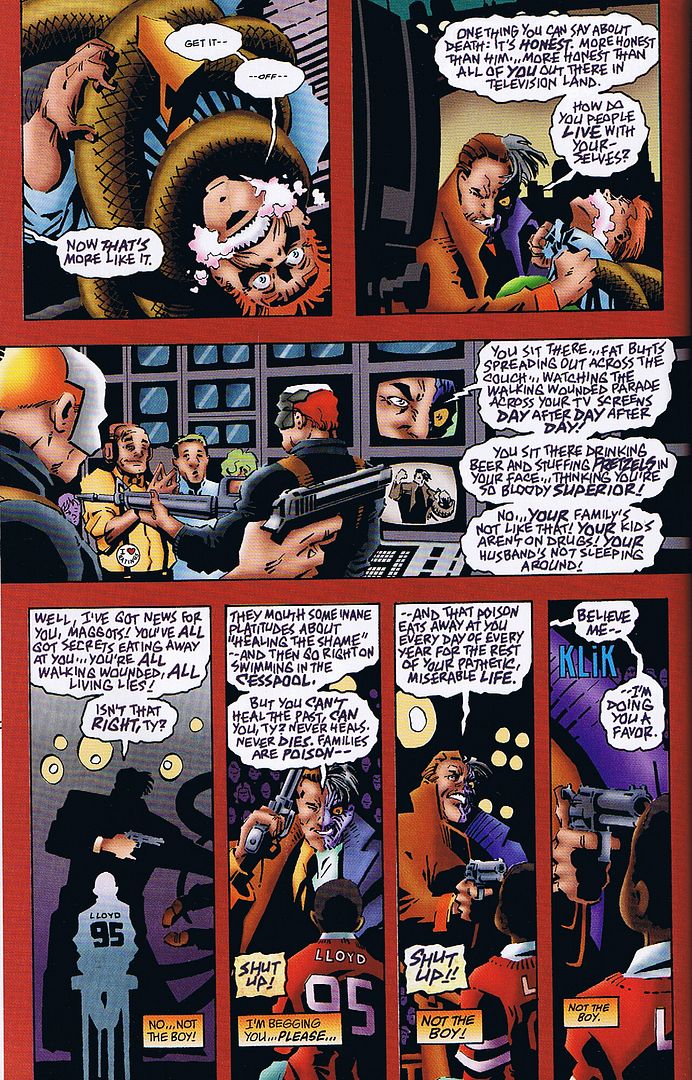
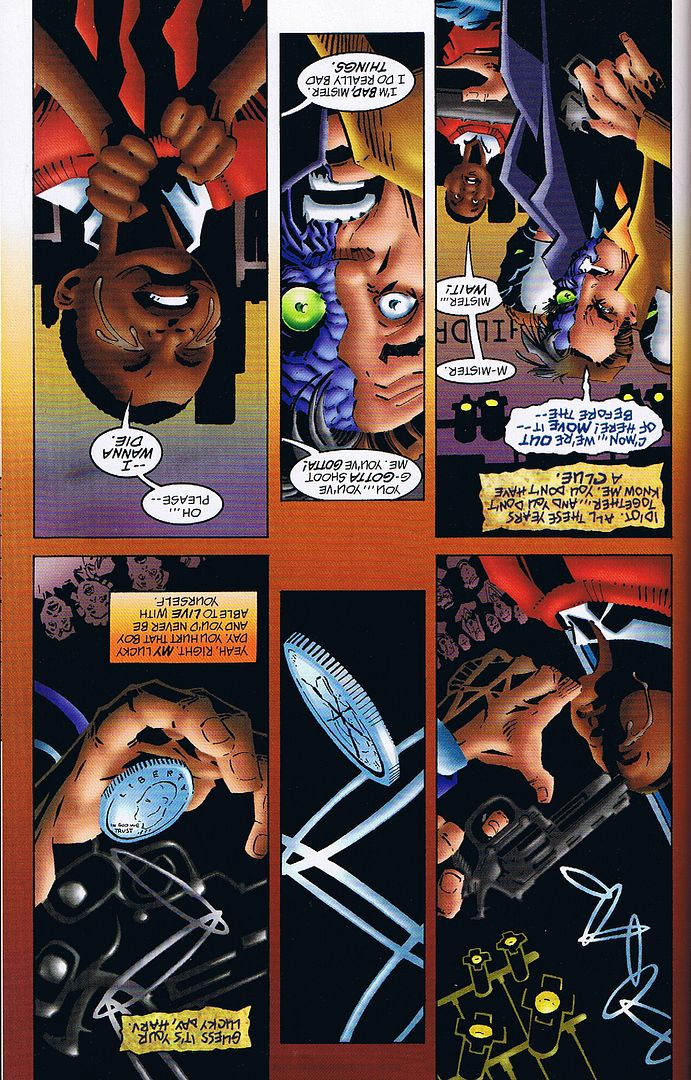
When Harvey asks the kid, "Who told you you were bad?" the kid reluctantly admits that it was his own father. Harvey's bitter laugh hardens his contempt for Gotham's "hypocrisy" into a full-blown vendetta. "How do you like THAT, Gotham? Did that go down well with the chips and beer? His Daddy beats the CRAP out of him... and tells him it's HIS fault!" Swearing to "punish" Gotham for being "bad," Harvey proceeds to spend the next week bombing the living fuck out of the city. It's made explictly clear that this reign of violence and terror is bad even by Gotham standards, and what's worse, there seems to be no reason. Just chaos. But Batman knows better.
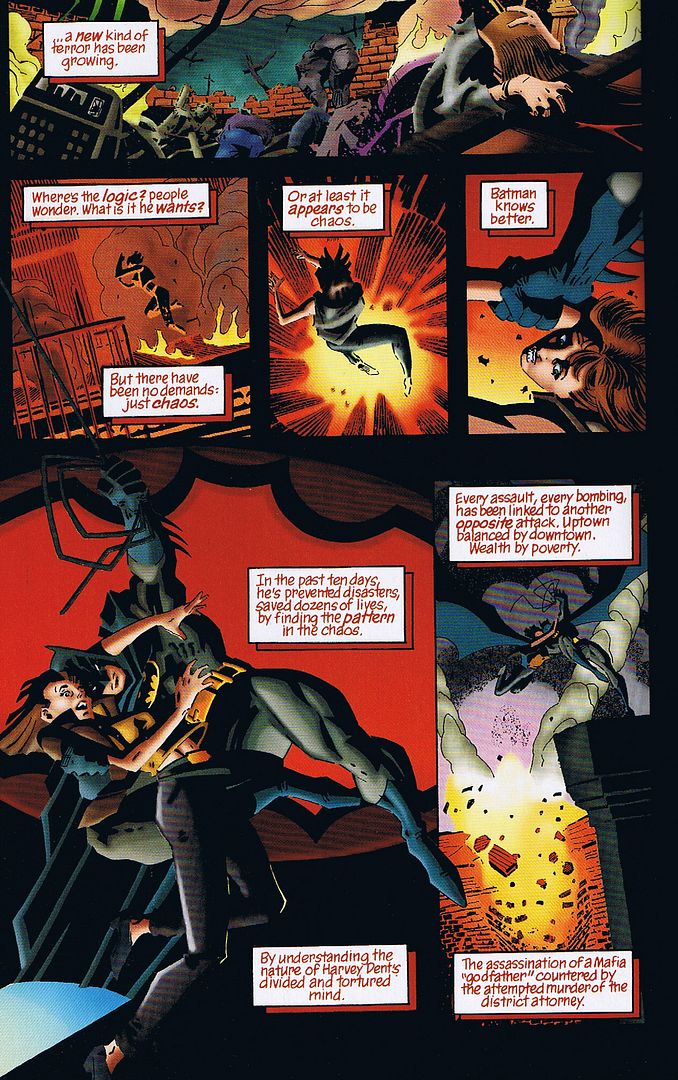
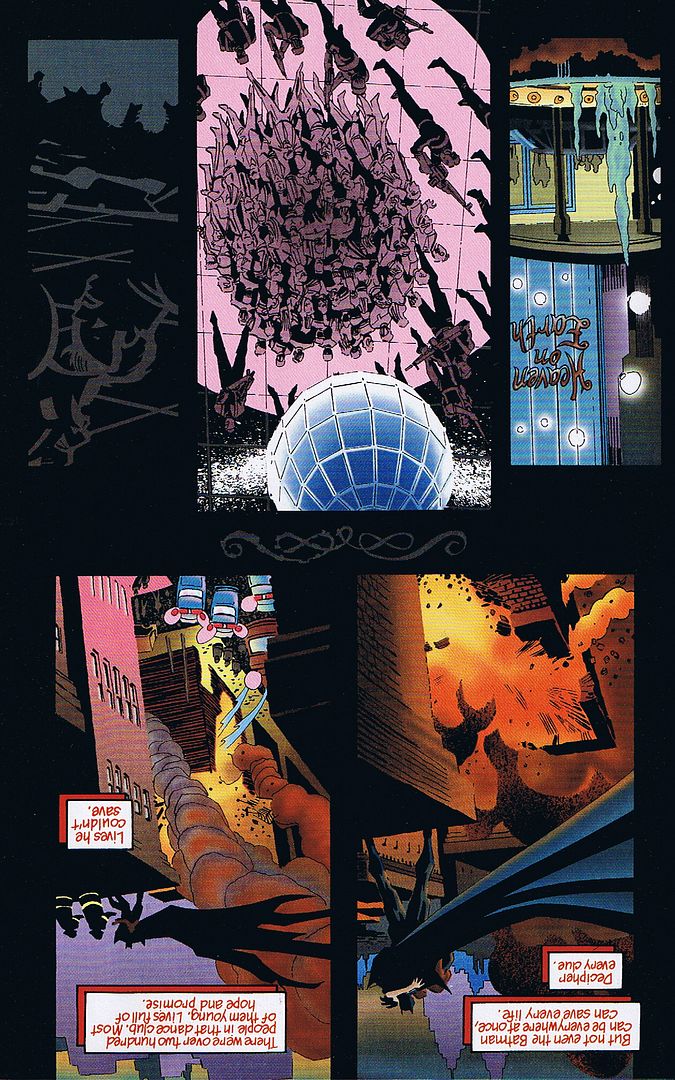
Two hundred people? Two hundred innocent people, killed by Harvey? That kinda really pushes the limits of sympathy for Harvey Dent, to say the least. But then, I suppose that one really has to see Harvey as a victim himself, utterly helpless to stop the monster who's taken over his body. Except... the monster is also Harvey Dent. Remember, Two-Face isn't a whole other personality the way that Scarface is separate from the Ventriloquist. Two-Face is a vital part of Harvey himself, albeit a part that was suppressed to fester for years. Read on, and consider how much--if any--Harvey is to be blamed for the actions of Two-Face.
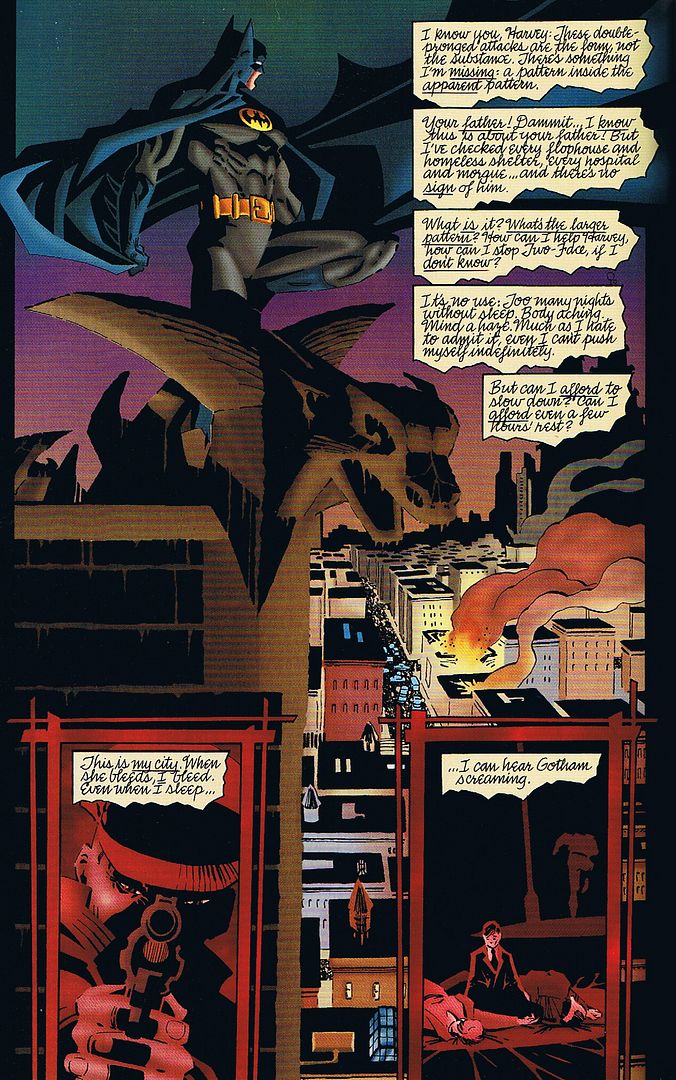
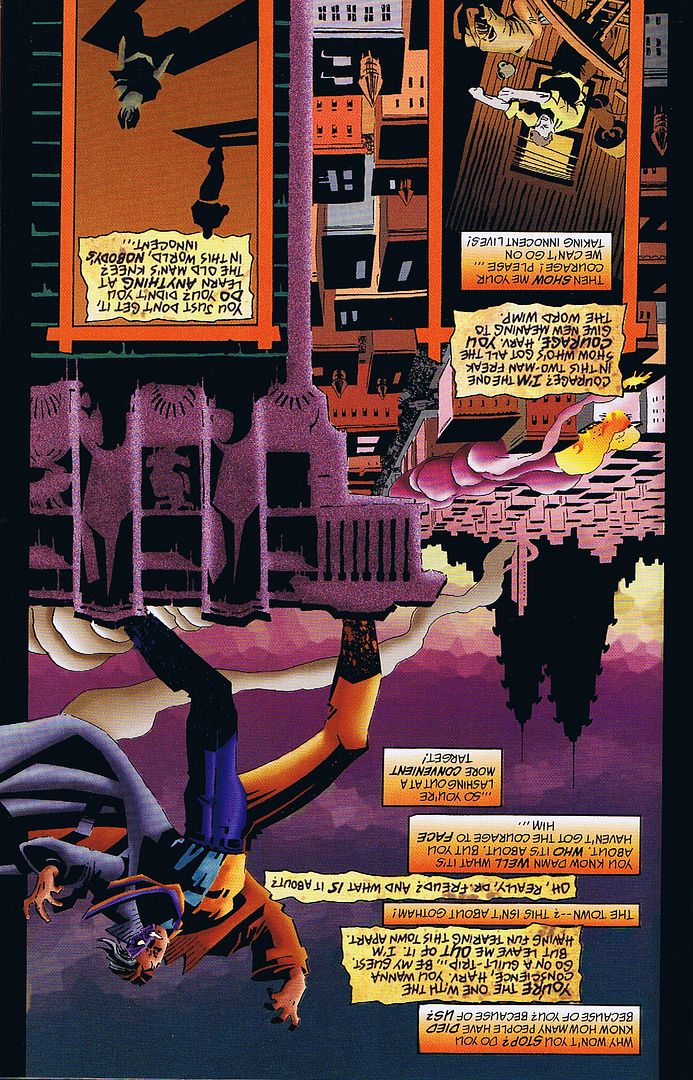
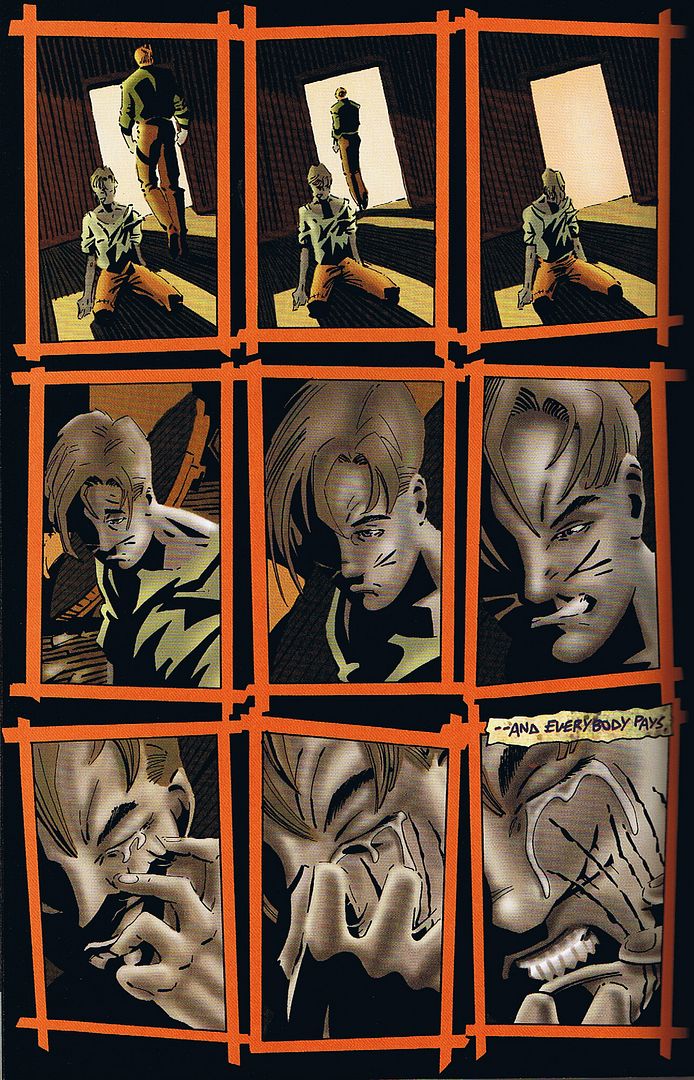
Let's talk about child abuse.
I used to worry that this take on Harvey's abuse was more generalized, and therefore more cliched along the lines of "I was beaten as a child, now I'm crazy and evil!" as opposed to be original version presented in Eye of the Beholder. Remember, in that version, he's psychologically and physically abused by the game his father played with the coin. "Heads I beat you, tails I don't. You're tails, you're always tails, you chose to be tails." This led to the idea that the split in Harvey's head occurred between his "good" side (the side which loved his father, which believed that the game was fair, that Harvey actually had a choice) and his "bad" side (which knewthat the game was rigged, that his beloved father was an evil fuckwad, that he never had ANY choice), and when the acid scarring hit, the two sides split off into constant conflict and deadlock, which could only be broken by the coin.
That's a tough mindset for any writer to understand, much less replicate in a tasteful way. At the same time, it's also very... specific. I'm reminded of what Garth Ennis said about Alan Moore and The Killing Joke. As Ennis told it, Moore said that the point of TKJ was that Batman and The Joker are two sides of the same coin, but concluded that neither character resembled anyone that would ever exist in real life, so who cares? Now, while I personally disagree with that (there's plenty more about the human condition to be taken from TKJ that resonates with people in real life), I'm not sure that the EotB origin for Two-Face really matters for anyone other than Harvey.
I suspect that DeMatteis' origin here is actually more universal, in that it at least deals with common patterns of abuse victims. Granted, no one can really understand what it's like to be abused unless you were abused yourself, so that's a limit right there. But I don't think anybody has really gone through the kind of experience that Harvey went through in EotB, whereas I'm sure that MANY people can relate to Harvey's abuse here in Two-Face: Crime and Punishment. Just like "The Child Within," it treats the abuse victim as believing themselves in the wrong, that they HAD to be in the wrong somehow, that the abuser wouldn't have done that if only they, the abused, had behaved correctly. As a result, the abused turn their anger inward to shame and self-loathing, and this works very well on a specific level for Harvey Dent.
Yeah, intellectually, I think this might work better. And yet, emotionally, the Eye of the Beholder origin resonates far more with me personally. So I'm at a loss here.
Right. Back to the story.
Batman finally discovers the pattern in the chaos, finding the attacks are circling around a very wealthy, high-rent district in Gotham. What the hell could that have to do with a penniless bum like Christopher Dent?
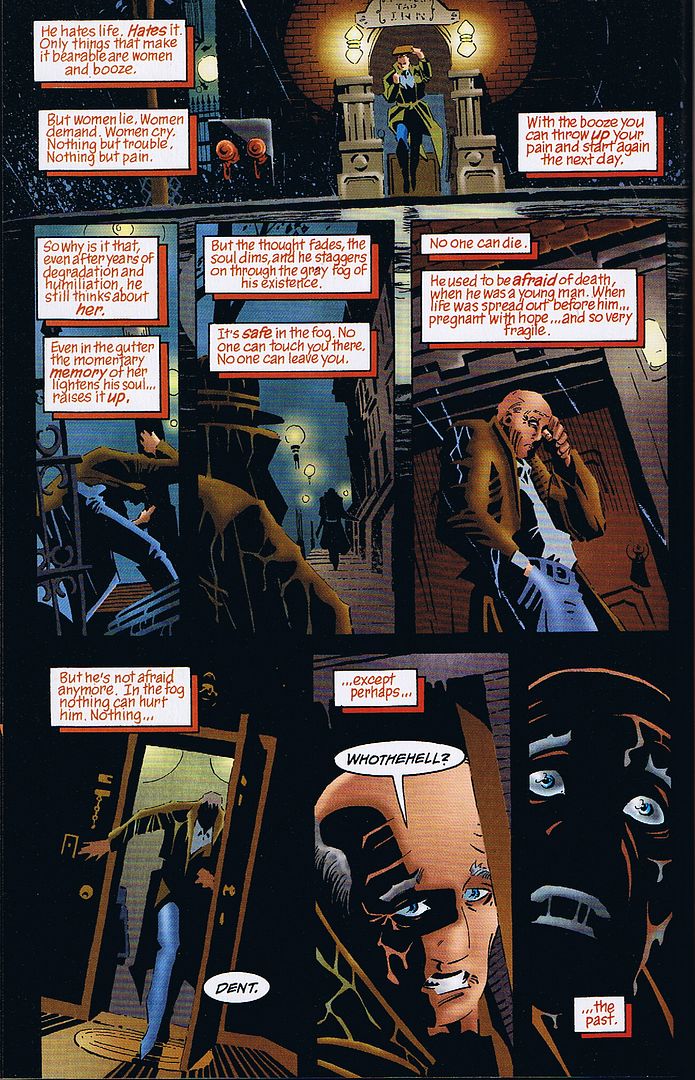
That's the closest we've ever come to seeing the monster up close, and just like meeting Joe Chill, it's a vaguely anticlimactic reminder of the banality of evil. On top of that, it's hardly a portrait of the man, barely even a sketch. Really, the only thing to be taken from this is the implication that he dearly loved his wife, Harvey's mother, and that it was her death that made a mostly-bitter young bastard into a full-time bitter old bastard. Notice that even with Harvey waging war on the whole city, he's nowhere to be found in Christopher Dent's thoughts.
Finally ready for the endgame, Harvey takes it right back to where it started: on live TV.
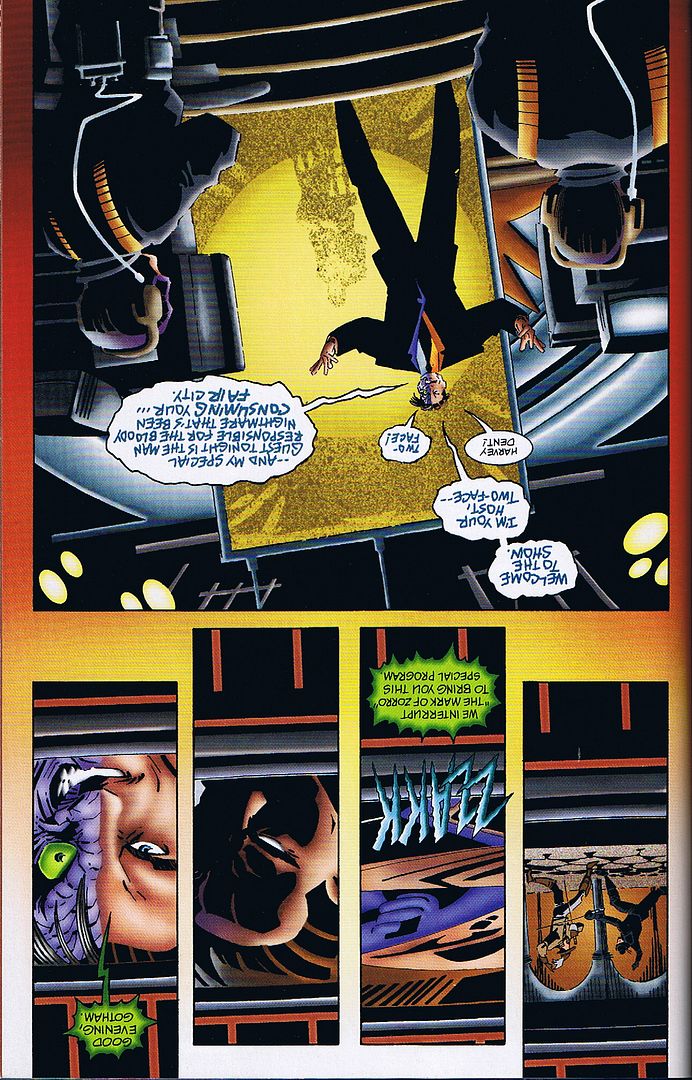
Gotta say, I know it's just an artistic lighting choice, but I kinda like the idea of Two-Face wearing a black suit with split-color lapels. Sadly, it's just his regular suit, as you'll soon see. It's no longer the Golden Age, why is he still wearing orange and purple? Sigh.
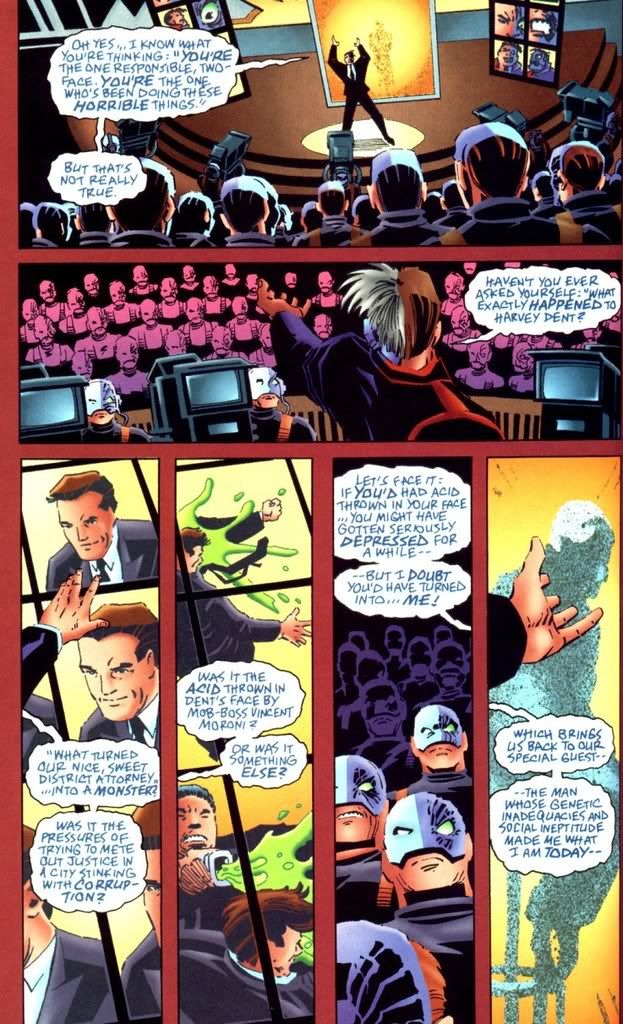
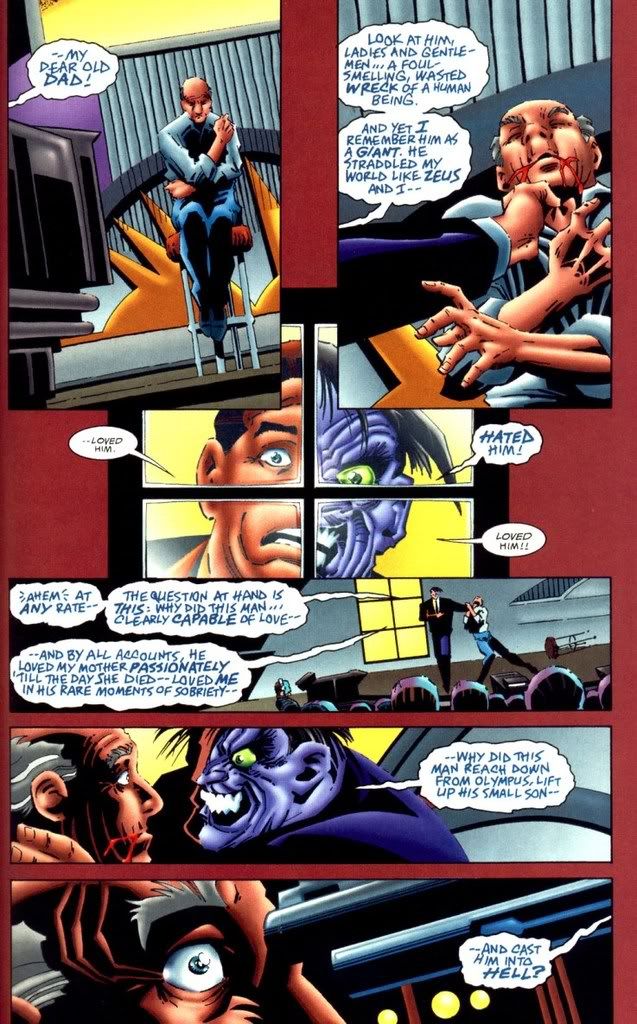
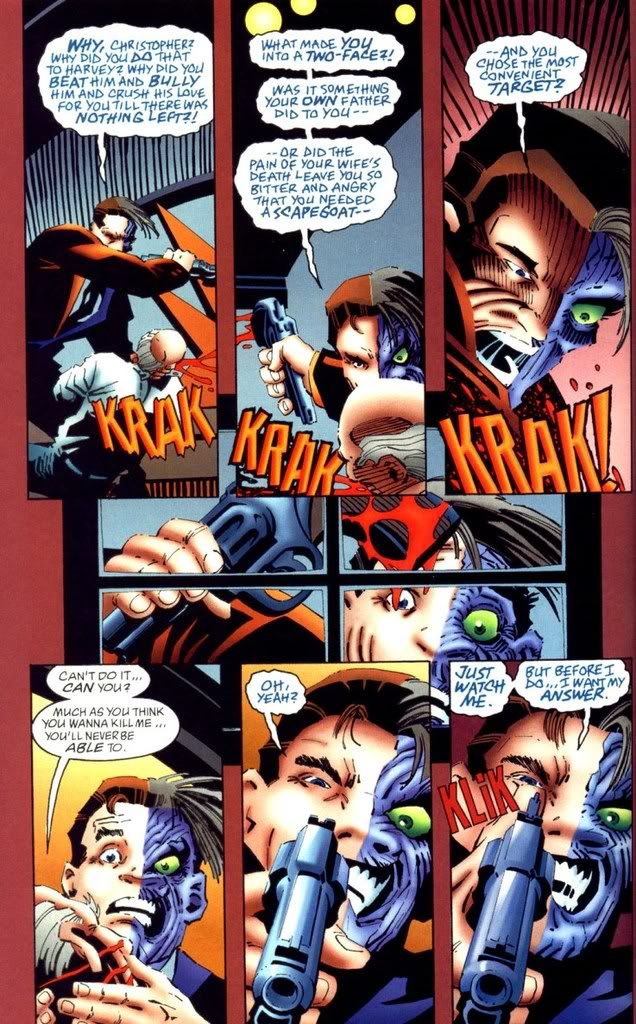
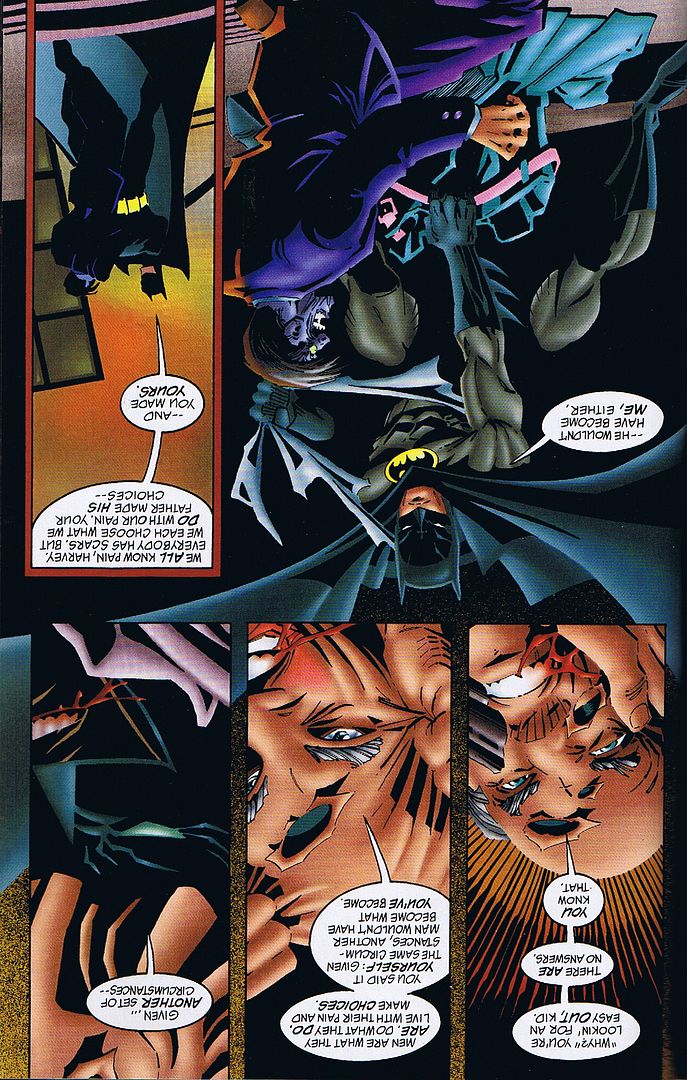
First off, I think that "There ARE no answers" is probably the most resonant line to me. That's a cold, hard fact right there, the realization that you're never going to get any real explanation. Hell, even if you did, it almost certainly wouldn't be satisfying. And yet, that'll never stop anyone from asking "Why?" and looking for someway, any way, to make sense of it all.
As with EotB, we're directly tackling the very-Two-Face theme of choice and free will, only this time, Batman's putting the blame directly on Harvey, taking us directly into Killing Joke territory ("Maybe it was just YOU all along"). Again, I ask: just how responsible IS Harvey for Two-Face's actions? How much of his situation really was/is his choice? Is Batman speaking directly to Harvey as a whole, or just the Two-Face side? I think these answers are important, because remember: two hundred people. Dead, because of Two-Face. So either Batman is condemning a monster who must be forced to look within, or he's pulling a serious dick move by telling Harvey that his mental illness is his own fault.
For Two-Face's part, he seems to side with the second option. As the henchmen attack Batman, Harvey says, "I didn't choose. HE did this to me. It was his fault. And he's going to PAY!"
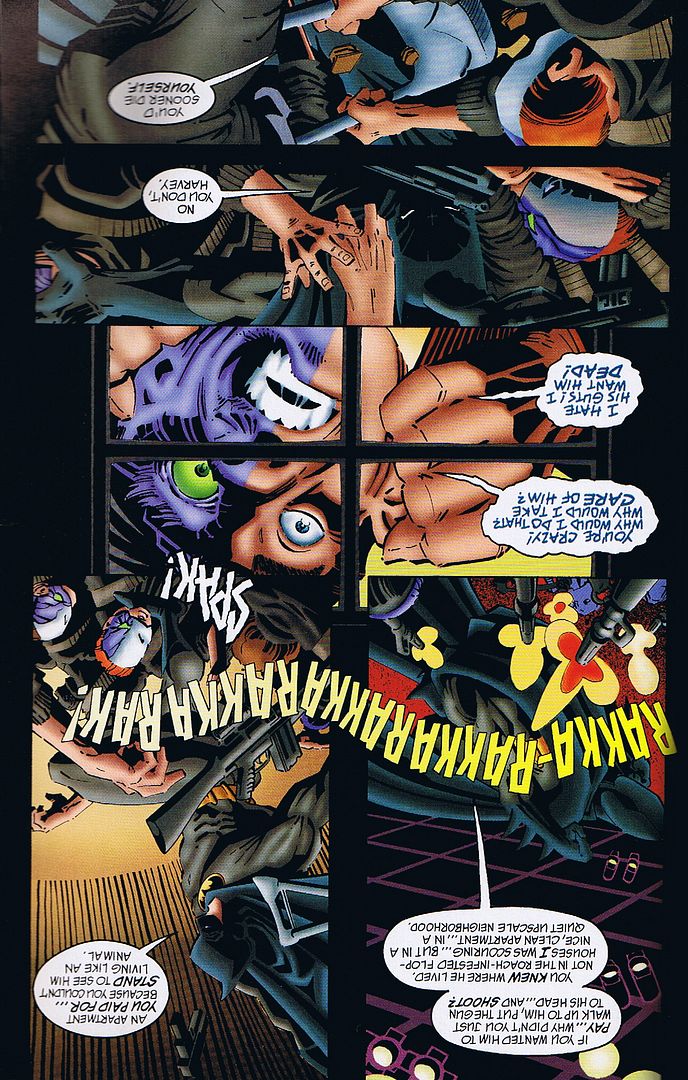
Wait. How could Harvey, neither side of Harvey, know that he was paying for his father to live in an upscale neighborhood? Because this really seems to be news to Two-Face! Was he just so deeply in denial, and if so, how the heck does THAT work? For that matter, it's clear from what we've seen that Harvey and his father are quite estranged. How did he arrange for all that without actually being in touch with Christopher Dent?
Okay, so these logistical thoughts are probably besides the point, which is that Harvey doesn't really want to kill his father. Or rather, he DOES, but he's UNABLE to. Which essentially has made this whole story an exercise in raw, violent, futile rage. Which, as Henchgirl points out, comes right along with the territory of child abuse.
Freaking the crap out, Two-Face flees from the studio while Batman makes short work of the dozen or so thugs.
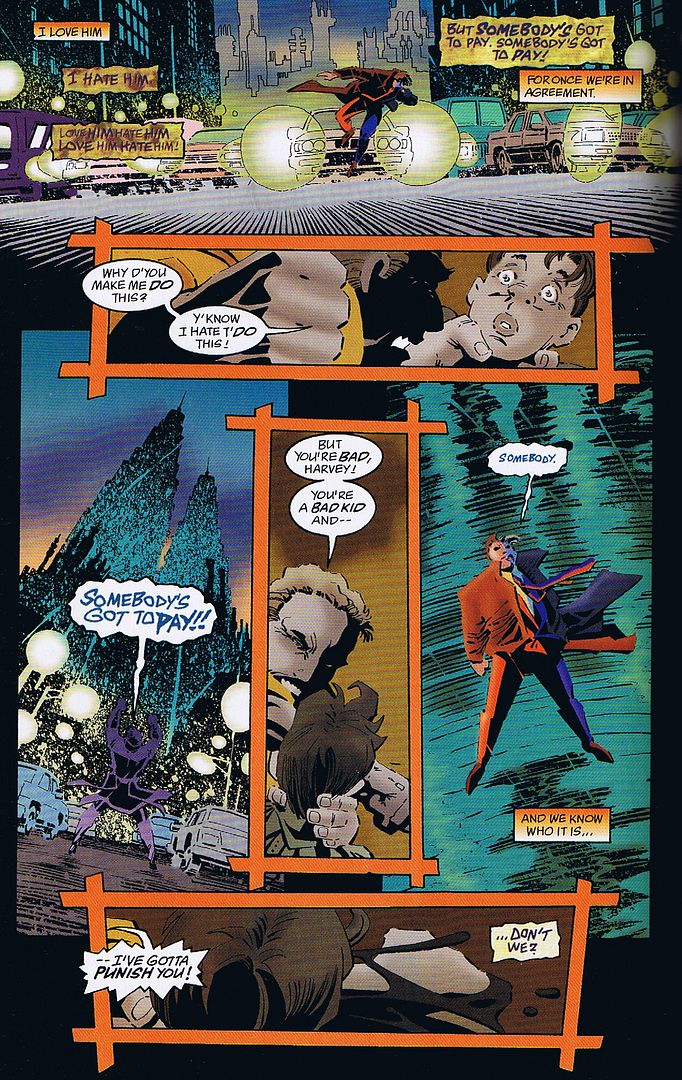
And thus we catch up with the book's opening scene where, taking Batman's words to heart, Harvey jumps off the building. However, his death plummet is foiled by Batman, who swings in to save his friend. Two-Face protests, and while I think it was clear throughout, this last scene really drives home the idea that Two-Face--like Vermin--is just an angry, overgrown child. I'm not sure how I feel about this, or how it's written in these next few panels. Does Two-Face even now still have the logic of an abused child? Does he really believe that at heart, when everything else is exposed away? When you strip away everything that is Harvey Dent to his raw, wounded core, is there nothing but a scared, self-loathing child who wants to be destroyed?
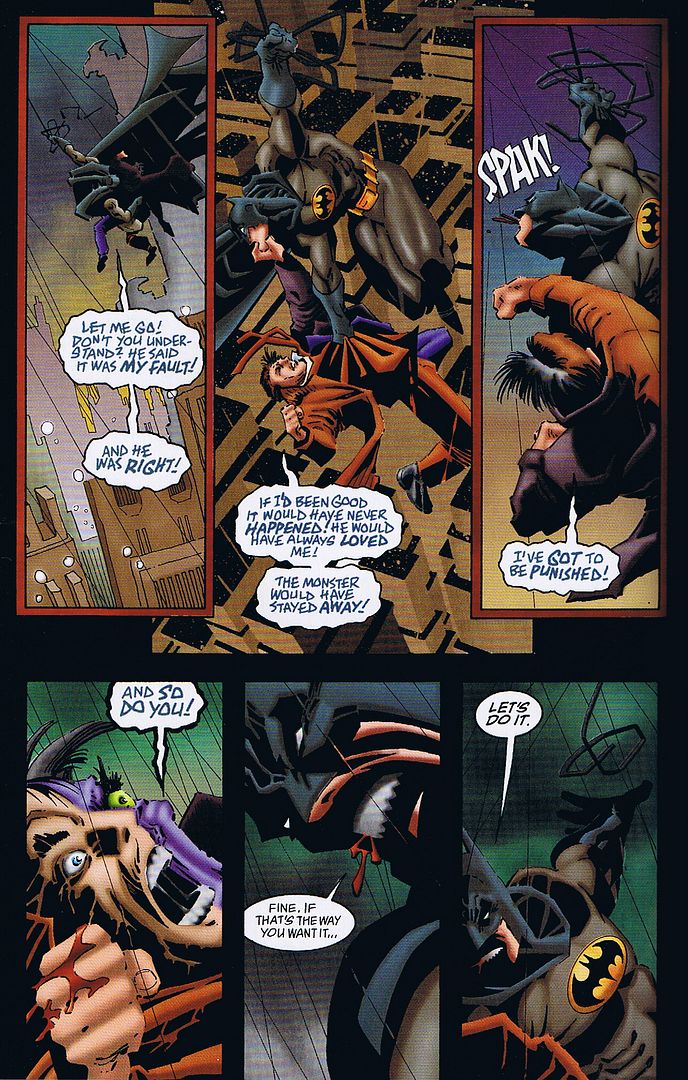
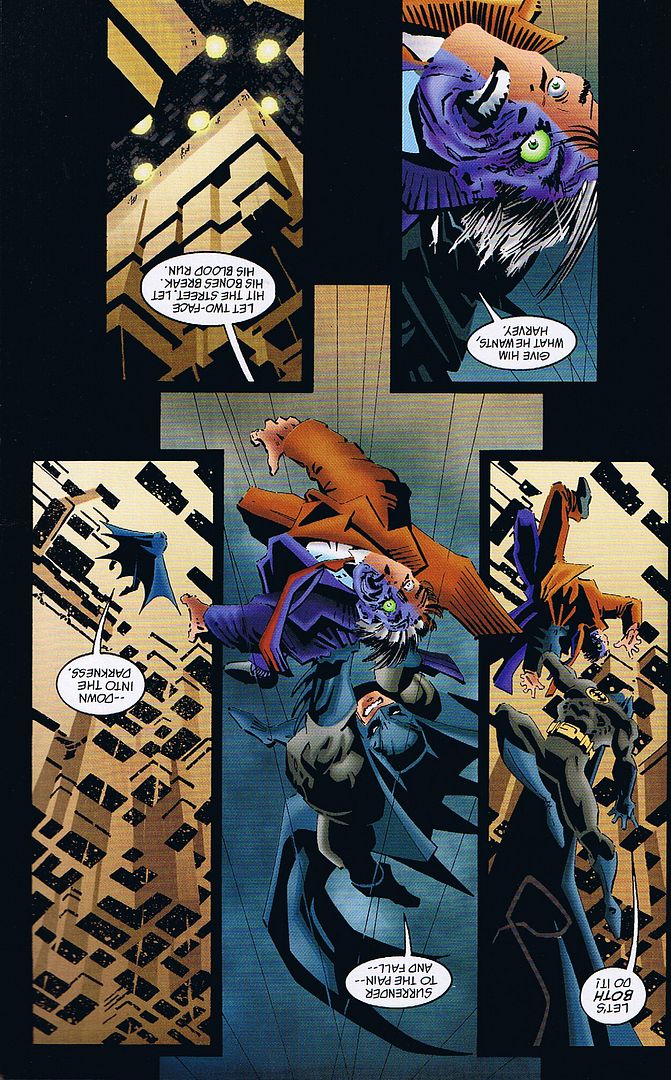
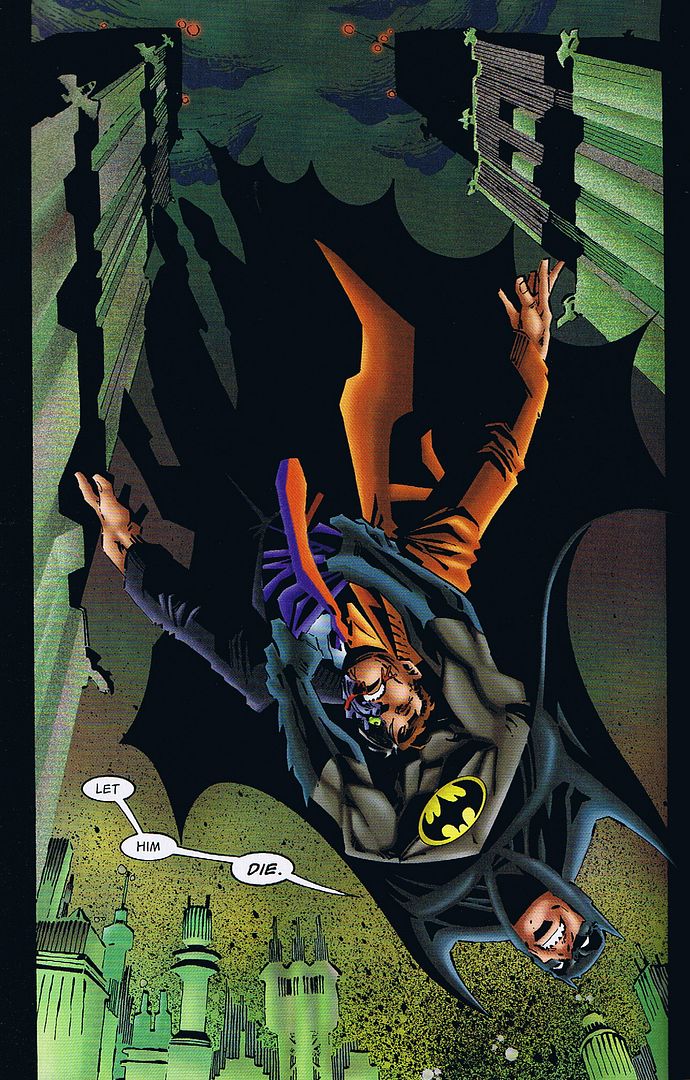
As Harvey passes out from the shock, Batman pulls another grappling hook and swings them both to safety.
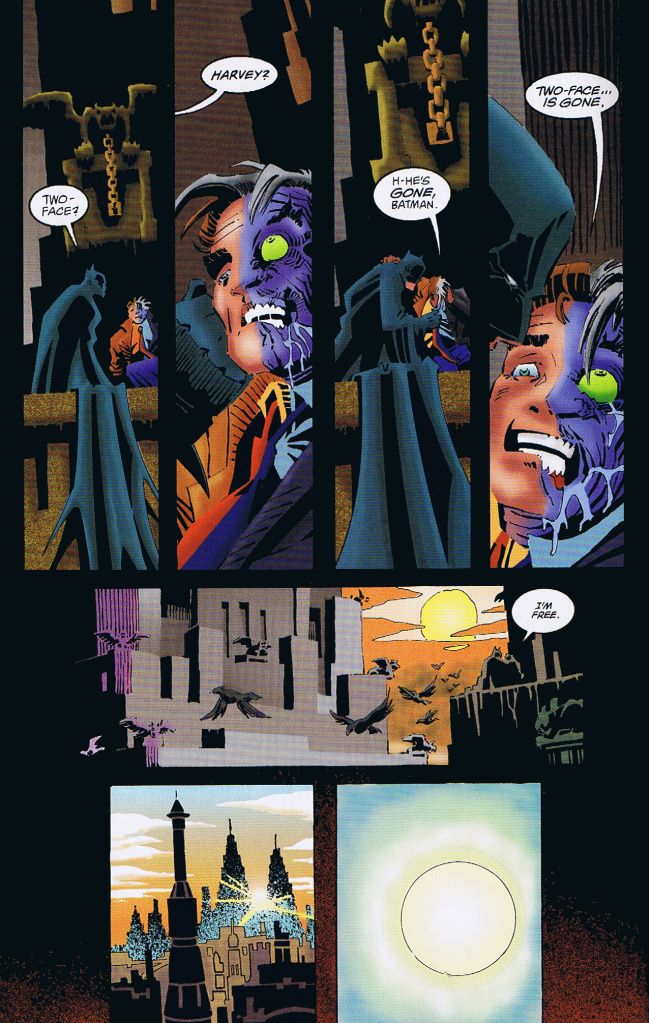
Even at the time, I knew it wouldn't last. But that was the first time anyone had given Harvey a happy ending for at least fifteen years, if you can even count the story of Gilda's return a "happy ending." But then, even a temporary period of freedom for Harvey is better than he usually gets.
That said, does Harvey even DESERVE that happy ending/respite? Again, it hinges on how much Harvey was himself responsible for Two-Face's actions. I think that a big reason why Harvey's freedom from Two-Face is short-lived is because Two-Face isn't some tumor that can be cut off from the whole. It's a very real part of himself, perhaps even half of his own being, without whom Harvey Dent may only be half a man. Hell, as DeMatteis himself later proved in an issue of The Spectre, Harvey Dent without Two-Face is a man out of balance. Perhaps not coincidentally, that issue also explored the questions of Harvey's own capability for redemption, and how maddeningly murky an issue that could be.
I guess what really bothers me if the fact that we don't really see the majority of Two-Face's attacks on the city. We only hear about them via narration. We learn nothing about the (over two hundred!) victims, or their suffering, or the aftermath for the survivors and their families. It's all so... impersonal. They're faceless victims, just as they were faceless masses when Harvey condemned them on TV.
So, I guess what I'm saying is, I'm still not sure how I feel about this story, not even sixteen years after it was published. What do you guys think?
*Maybe that's why Penguin Triumphant (which, like B/TF:C&P, was published to coincide with the release of a Batman movie) isn't even remembered by comic fans at large, much less rightly hailed as the greatest Penguin comic ever.
Why have no other stories looked at the abuse angle with Two-Face? I’d imagine it’s because “angsty, abused childhood” is the #1 cliched origin for villains. Now, I love how Eye of the Beholder made that cliche work perfectly for Harvey in a way that was fitting and deeply emphasized the tragic aspect of the character, but it’s such a complex, nuanced backstory that I fear for how other writers would screw it up. Thus, it’s probably best that it’s avoided by most writers... but then, J.M. DeMatteis is not like most writers. The world of comics is poorer for that.

That said, my personal opinion of this story has fluctuated over the years, all the more so recently after reading DeMatteis' Spectacular Spider-Man story, "The Child Within. So I will especially welcome your comments for this review, especially from those who've read the story in full. Is this a powerful take on Two-Face, or yet another half-baked child abuse origin?
First: an introduction.
You guys know that I normally like to cut in with commentary every few pages or so, but I'm gonna hold off for these first seven pages. DeMatteis had written an opening with such a great flow that I'd be loathe to break it up. So let me get one big observation out of the way first, something for you folks to bear in mind as you read on.
Here's the thing: I think that this story is the first time we've ever seen the two sides of Harvey's mind interacting with one another so explicitly. There was a touch of that in Eye of the Beholder (written by Andrew Helfer, who was DeMatteis' editor on Justice League International), followed by a weeny bit of both sides in Doug Moench's Knightfall-era story with Klaus Janson, but not to this extent. Before these stories, Two-Face shifted between his good and evil sides, but neither had a distinct personality, nor did they ever interact with one another for any real lengthy period of time.
As I read this, the question I'm wondering is whether or not it's always been like this inside Harvey's head, and we've just never seen it. If it wasn't, then maybe this story presents the progression of Harvey's mental illness. The sad, scary possibility here is that perhaps he's only been getting worse.







Whew.
Okay, first off, does anyone else find it jarring to imagine little Harvey Dent on a farm, even if he was only visiting? He's a dyed-in-the-wool city boy, far as I'm concerned. The only reason for that setting is, I'd imagine, to give Harvey a safe place to fall from a decent height while still not hurting himself. You can't really do that, say, off of fire escapes and into piles of garbage sacks, can you?
At the very least, it gives us the only sketchiest details about Christopher Dent's own past. In Eye of the Beholder, all we knew was that he was a drunken man who probably liked to play con games. Here, I think it's safe to say that the elder Dent was a displaced farm boy, right down to his steer-headed belt buckle. If his father, Harvey's grandfather, was still alive at the time, I would have been interested to know what he might have made of Harvey's injuries. There's always the possibility--briefly raised later on--that Grandpa had given Christopher the same treatment. Just like with Norman and Harry Osborn, the horrible cycle continues.
But now let's talk about what's actually IN this story.
We flash back to the modern-day events which led to the opening scene on the tower. Two-Face crashes a live TV broadcast of a Maury Povich style talk show, focusing on interviews with abused children. Harvey kills the host (with a pair of giant snakes, because why not?), and proceeds to condemn the viewing audiences who tune in to support this kind of "entertainment." What's Harvey's motivation? It's certainly not monetary. Kind of makes me wonder how he can amass and keep an army of henchmen at his disposal.


When Harvey asks the kid, "Who told you you were bad?" the kid reluctantly admits that it was his own father. Harvey's bitter laugh hardens his contempt for Gotham's "hypocrisy" into a full-blown vendetta. "How do you like THAT, Gotham? Did that go down well with the chips and beer? His Daddy beats the CRAP out of him... and tells him it's HIS fault!" Swearing to "punish" Gotham for being "bad," Harvey proceeds to spend the next week bombing the living fuck out of the city. It's made explictly clear that this reign of violence and terror is bad even by Gotham standards, and what's worse, there seems to be no reason. Just chaos. But Batman knows better.


Two hundred people? Two hundred innocent people, killed by Harvey? That kinda really pushes the limits of sympathy for Harvey Dent, to say the least. But then, I suppose that one really has to see Harvey as a victim himself, utterly helpless to stop the monster who's taken over his body. Except... the monster is also Harvey Dent. Remember, Two-Face isn't a whole other personality the way that Scarface is separate from the Ventriloquist. Two-Face is a vital part of Harvey himself, albeit a part that was suppressed to fester for years. Read on, and consider how much--if any--Harvey is to be blamed for the actions of Two-Face.



Let's talk about child abuse.
I used to worry that this take on Harvey's abuse was more generalized, and therefore more cliched along the lines of "I was beaten as a child, now I'm crazy and evil!" as opposed to be original version presented in Eye of the Beholder. Remember, in that version, he's psychologically and physically abused by the game his father played with the coin. "Heads I beat you, tails I don't. You're tails, you're always tails, you chose to be tails." This led to the idea that the split in Harvey's head occurred between his "good" side (the side which loved his father, which believed that the game was fair, that Harvey actually had a choice) and his "bad" side (which knewthat the game was rigged, that his beloved father was an evil fuckwad, that he never had ANY choice), and when the acid scarring hit, the two sides split off into constant conflict and deadlock, which could only be broken by the coin.
That's a tough mindset for any writer to understand, much less replicate in a tasteful way. At the same time, it's also very... specific. I'm reminded of what Garth Ennis said about Alan Moore and The Killing Joke. As Ennis told it, Moore said that the point of TKJ was that Batman and The Joker are two sides of the same coin, but concluded that neither character resembled anyone that would ever exist in real life, so who cares? Now, while I personally disagree with that (there's plenty more about the human condition to be taken from TKJ that resonates with people in real life), I'm not sure that the EotB origin for Two-Face really matters for anyone other than Harvey.
I suspect that DeMatteis' origin here is actually more universal, in that it at least deals with common patterns of abuse victims. Granted, no one can really understand what it's like to be abused unless you were abused yourself, so that's a limit right there. But I don't think anybody has really gone through the kind of experience that Harvey went through in EotB, whereas I'm sure that MANY people can relate to Harvey's abuse here in Two-Face: Crime and Punishment. Just like "The Child Within," it treats the abuse victim as believing themselves in the wrong, that they HAD to be in the wrong somehow, that the abuser wouldn't have done that if only they, the abused, had behaved correctly. As a result, the abused turn their anger inward to shame and self-loathing, and this works very well on a specific level for Harvey Dent.
Yeah, intellectually, I think this might work better. And yet, emotionally, the Eye of the Beholder origin resonates far more with me personally. So I'm at a loss here.
Right. Back to the story.
Batman finally discovers the pattern in the chaos, finding the attacks are circling around a very wealthy, high-rent district in Gotham. What the hell could that have to do with a penniless bum like Christopher Dent?

That's the closest we've ever come to seeing the monster up close, and just like meeting Joe Chill, it's a vaguely anticlimactic reminder of the banality of evil. On top of that, it's hardly a portrait of the man, barely even a sketch. Really, the only thing to be taken from this is the implication that he dearly loved his wife, Harvey's mother, and that it was her death that made a mostly-bitter young bastard into a full-time bitter old bastard. Notice that even with Harvey waging war on the whole city, he's nowhere to be found in Christopher Dent's thoughts.
Finally ready for the endgame, Harvey takes it right back to where it started: on live TV.

Gotta say, I know it's just an artistic lighting choice, but I kinda like the idea of Two-Face wearing a black suit with split-color lapels. Sadly, it's just his regular suit, as you'll soon see. It's no longer the Golden Age, why is he still wearing orange and purple? Sigh.




First off, I think that "There ARE no answers" is probably the most resonant line to me. That's a cold, hard fact right there, the realization that you're never going to get any real explanation. Hell, even if you did, it almost certainly wouldn't be satisfying. And yet, that'll never stop anyone from asking "Why?" and looking for someway, any way, to make sense of it all.
As with EotB, we're directly tackling the very-Two-Face theme of choice and free will, only this time, Batman's putting the blame directly on Harvey, taking us directly into Killing Joke territory ("Maybe it was just YOU all along"). Again, I ask: just how responsible IS Harvey for Two-Face's actions? How much of his situation really was/is his choice? Is Batman speaking directly to Harvey as a whole, or just the Two-Face side? I think these answers are important, because remember: two hundred people. Dead, because of Two-Face. So either Batman is condemning a monster who must be forced to look within, or he's pulling a serious dick move by telling Harvey that his mental illness is his own fault.
For Two-Face's part, he seems to side with the second option. As the henchmen attack Batman, Harvey says, "I didn't choose. HE did this to me. It was his fault. And he's going to PAY!"

Wait. How could Harvey, neither side of Harvey, know that he was paying for his father to live in an upscale neighborhood? Because this really seems to be news to Two-Face! Was he just so deeply in denial, and if so, how the heck does THAT work? For that matter, it's clear from what we've seen that Harvey and his father are quite estranged. How did he arrange for all that without actually being in touch with Christopher Dent?
Okay, so these logistical thoughts are probably besides the point, which is that Harvey doesn't really want to kill his father. Or rather, he DOES, but he's UNABLE to. Which essentially has made this whole story an exercise in raw, violent, futile rage. Which, as Henchgirl points out, comes right along with the territory of child abuse.
Freaking the crap out, Two-Face flees from the studio while Batman makes short work of the dozen or so thugs.

And thus we catch up with the book's opening scene where, taking Batman's words to heart, Harvey jumps off the building. However, his death plummet is foiled by Batman, who swings in to save his friend. Two-Face protests, and while I think it was clear throughout, this last scene really drives home the idea that Two-Face--like Vermin--is just an angry, overgrown child. I'm not sure how I feel about this, or how it's written in these next few panels. Does Two-Face even now still have the logic of an abused child? Does he really believe that at heart, when everything else is exposed away? When you strip away everything that is Harvey Dent to his raw, wounded core, is there nothing but a scared, self-loathing child who wants to be destroyed?



As Harvey passes out from the shock, Batman pulls another grappling hook and swings them both to safety.

Even at the time, I knew it wouldn't last. But that was the first time anyone had given Harvey a happy ending for at least fifteen years, if you can even count the story of Gilda's return a "happy ending." But then, even a temporary period of freedom for Harvey is better than he usually gets.
That said, does Harvey even DESERVE that happy ending/respite? Again, it hinges on how much Harvey was himself responsible for Two-Face's actions. I think that a big reason why Harvey's freedom from Two-Face is short-lived is because Two-Face isn't some tumor that can be cut off from the whole. It's a very real part of himself, perhaps even half of his own being, without whom Harvey Dent may only be half a man. Hell, as DeMatteis himself later proved in an issue of The Spectre, Harvey Dent without Two-Face is a man out of balance. Perhaps not coincidentally, that issue also explored the questions of Harvey's own capability for redemption, and how maddeningly murky an issue that could be.
I guess what really bothers me if the fact that we don't really see the majority of Two-Face's attacks on the city. We only hear about them via narration. We learn nothing about the (over two hundred!) victims, or their suffering, or the aftermath for the survivors and their families. It's all so... impersonal. They're faceless victims, just as they were faceless masses when Harvey condemned them on TV.
So, I guess what I'm saying is, I'm still not sure how I feel about this story, not even sixteen years after it was published. What do you guys think?
*Maybe that's why Penguin Triumphant (which, like B/TF:C&P, was published to coincide with the release of a Batman movie) isn't even remembered by comic fans at large, much less rightly hailed as the greatest Penguin comic ever.